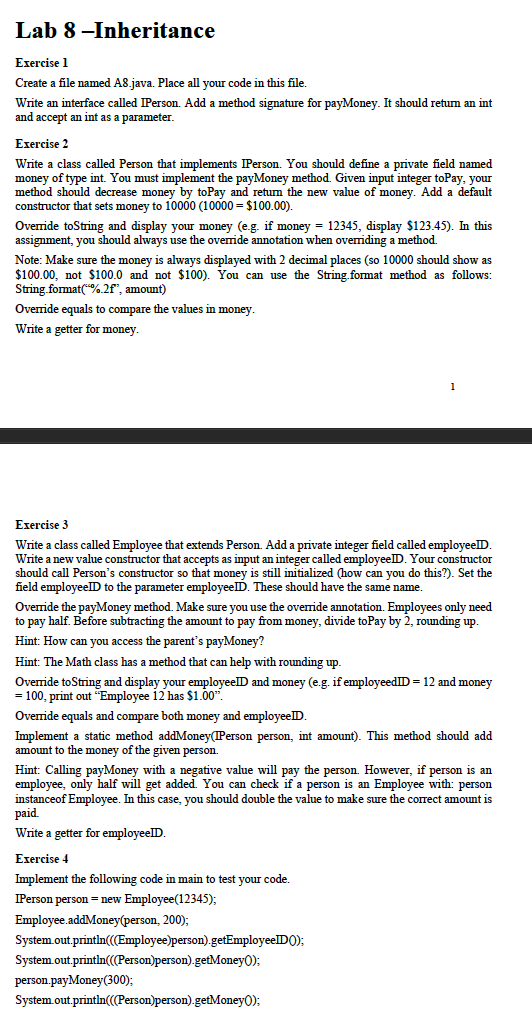
Lab 8 -Inheritance Exercise 1 Create a file named A8.java. Place all your code in this file. Write an interface called IPerson. Add a method signature for payMoney. It should retum an int and accept an int as a parameter. Exercise 2 Write a class called Person that implements IPerson. You should define a private field named money of type int. You must implement the payMoney method. Given input integer topay, your method should decrease money by to Pay and return the new value of money. Add a default constructor that sets money to 10000 (10000 = $100.00). Override toString and display your money (eg. if money = 12345, display $123.45). In this assignment, you should always use the override annotation when overriding a method. Note: Make sure the money is always displayed with 2 decimal places (so 10000 should show as $100.00, not $100.0 and not $100). You can use the String.format method as follows: String.format("%2f", amount) Override equals to compare the values in money. Write a getter for money. Exercise 3 Write a class called Employee that extends Person. Add a private integer field called employeelD. Write a new value constructor that accepts as input an integer called employee D. Your constructor should call Person's constructor so that money is still initialized (how can you do this?). Set the field employeeld to the parameter employeeID. These should have the same name. Override the payMoney method. Make sure you use the override annotation. Employees only need to pay half. Before subtracting the amount to pay from money, divide to Pay by 2, rounding up Hint: How can you access the parent's payMoney? Hint: The Math class has a method that can help with rounding up Override to String and display your employeel and money (e.g. if employeedID = 12 and money = 100, print out "Employee 12 has $1.00". Override equals and compare both money and employeeID. Implement a static method addMoney(IPerson person, int amount). This method should add amount to the money of the given person. Hint: Calling payMoney with a negative value will pay the person. However, if person is an employee, only half will get added. You can check if a person is an Employee with: person instanceof Employee. In this case, you should double the value to make sure the correct amount is paid. Write a getter for employeeID. Exercise 4 Implement the following code in main to test your code. IPerson person = new Employee(12345); Employee.addMoney(person, 200); System.out.println(((Employee)person).getEmployeeD): System.out.println(((Person)person).getMoney); person.payMoney(300); System.out.println(((Person)person).getMoney()







